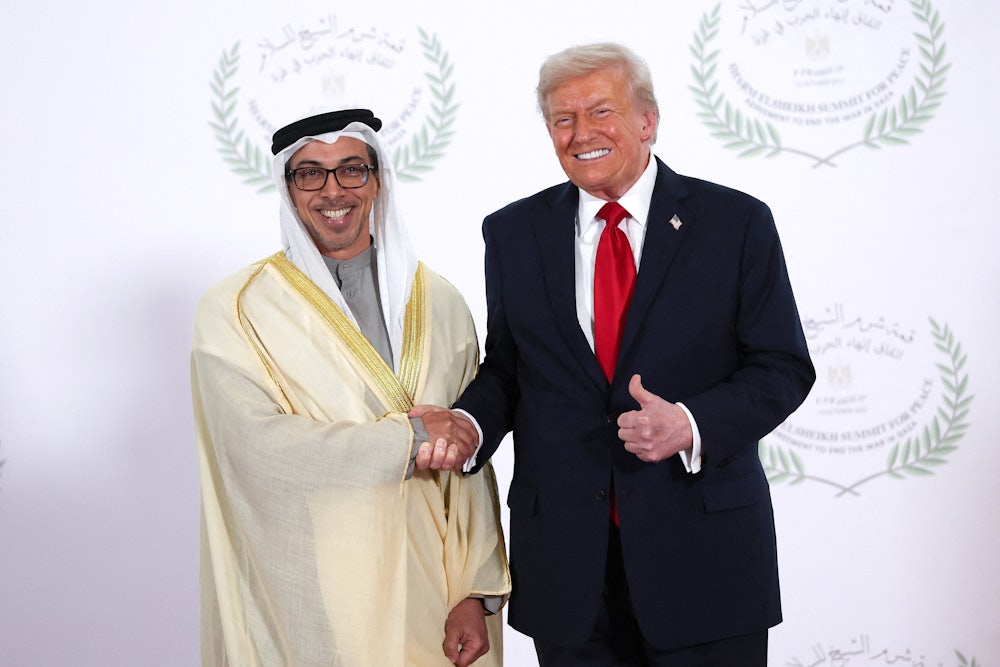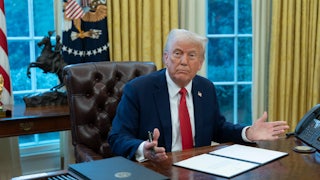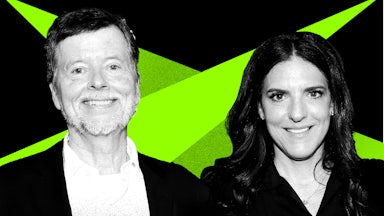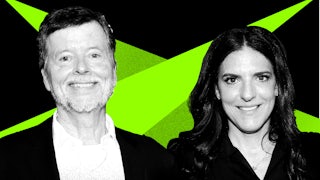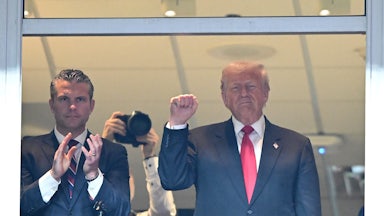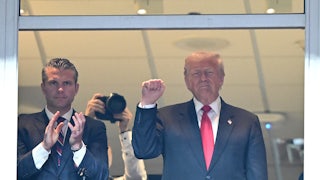Am I losing my mind?
I’ve been reading business stories about Microsoft sending advanced AI chips to the United Arab Emirates. This was made possible when the Trump administration, in May, removed a previous national security restriction on selling such chips to the UAE. But what these stories fail to mention is that the easing came just two weeks after the UAE purchased $2 billion in stablecoin from World Liberty Financial, in which the Trump family owns a large share. The purchase was, apparently, the largest crypto transaction in human history.
Imagine that you were to read about the California oil tycoon Edward Doheny’s acquisition, in 1922, of a government lease to pump oil out of Teapot Dome, Wyoming. Wouldn’t you expect to see some mention of the $100,000 in cash that Doheny arranged for his son Ned to wrap in brown paper and convey to Interior Secretary Albert Fall, who sold them the lease?
That’s how I felt reading a Wall Street Journal story on Monday under the headline, “Microsoft’s Efforts in the UAE Get a Big Boost.” The Journal reported that Microsoft secured U.S. approval to ship Nvidia chips to UAE, and that this approval had been expected as a result of Trump lifting restrictions on AI chip exports to UAE. “Security hawks warn that the deals could backfire given the U.A.E.’s close ties to China,” the Journal said.
But the Journal didn’t explain how those misgivings were overcome: The UAE dropped $2 billion on Trump’s crypto firm. For good measure, the UAE last October joined with Qatar in putting $1.5 billion into Jared Kushner’s private equity fund. That looked sufficiently like a bribe that Kushner, the president’s son-in-law, said on a podcast that his investors should expect no benefit in return. And yet a benefit was bestowed, seven months later, when the export restrictions were lifted.
A Page One New York Times story explained two months ago that the same cast of characters involved in easing the Biden-era export restriction was involved in the $2 billion stablecoin purchase. At the time, I described this as “the worst bribery scandal since Teapot Dome.” And that was before Trump granted a pardon to Binance founder Changpeng Zhao, whose firm was the final destination for the UAE’s $2 billion investment in the Trump stablecoin USD1. In a 60 Minutes episode that aired Sunday, Trump said of Zhao, “I don’t know who he is” but also, “This man was treated really badly by the Biden administration.”
Now I’m starting to wonder whether that Times story was a figment of my imagination. If Samuel Johnson could refute, by kicking a large stone, Bishop George Berkeley’s claim that matter doesn’t exist outside our perception of it, can I refute the nonexistence of a Times story by clicking onto it? Or would the immaterialists just answer that for every other browser it’s a dead link?
A word here about my use of the term “bribery.” The Supreme Court has so thoroughly eviscerated enforcement of the nation’s bribery statutes that unless the quid pro quo is recited like a catechism (“I’m doing X, and in exchange you shall do Y”), the courts won’t recognize that any crime was committed. On top of that, the Supreme Court, in its harebrained 2024 presidential immunity decision, invited presidents to conduct whatever illegal activities they like in the course of their official duties. So when I state that the UAE bribed Trump with a $2 billion investment in World Liberty Financial, I’m not suggesting that it was an illegal bribe. Do any still even exist? I’m merely saying that in a better-governed nation, such activities would be illegal and punished to the full extent of the law.
The Berkeleyan immaterialist position that the Times article does not exist is not confined to the Journal. Reuters, which on October 28 ran a superb investigative piece about the Trump family making a fortune off crypto, reported the Microsoft deal without mentioning the UAE’s $2 billion stablecoin purchase. So did CNBC, Bloomberg, Yahoo! Finance, the Associated Press, and the Financial Times, which ran an excellent piece last month that explained why experts worry UAE will share advanced AI chips with China—but did not explain how the UAE quieted those worries with a $2 billion investment in stablecoin. Not a lot of stone kicking on this story!
Some accounts noted that Trump said on 60 Minutes that the “most advanced [chips], we will not let anybody have them other than the United States,” and that the Microsoft deal seemed to contradict that. But that’s mere ankle biting, because who knows what “most advanced” even means? We don’t know for sure that Trump lied to 60 Minutes. We do know for sure that Trump’s crypto firm accepted $2 billion from the UAE and that two weeks later the export restriction vanished. Yet not even 60 Minutes made that connection.
I will now set Berkeleyan immaterialism aside and presume the Times story is not a figment of my imagination, but rather an important part of any story about Microsoft shipping advanced AI chips to the UAE. Why did it get left out? I can think of several reasons.
It raises murky questions about Microsoft. Microsoft last year put $1.5 billion into G42, the UAE firm at the center of both the UAE purchase of $2 billion in World Liberty Financial stablecoin and the negotiations, resolved two weeks later, to lift export restrictions on AI chips. G42 is controlled by Sheikh Tahnoon bin Zayed Al Nahyan, who, according to the Times, “controls $1.5 trillion of the Emirates’ wealth.”
As part of its investment in G42, Microsoft was granted a place on G42’s board. This was taken by Microsoft President Brad Smith. That raises the awkward question: What did Smith know about G42’s stablecoin purchase, and when did he know it? Which opens a whole can of worms that I presume the business press didn’t feel it had time for on a market-moving spot-news story. That said, I feel confident that if ever there’s a congressional investigation into those malodorous May transactions, Smith will be asked to testify.
“The cover-up is worse than the crime.” This venerable Washington adage was born during Watergate, a scandal in which the perpetrator of the underlying crime (bugging the Democratic National Committee headquarters) was never identified (though it was probably President Richard Nixon). The cover-up was what people got prosecuted for, but obviously the crime was worse than that because otherwise people wouldn’t do illegal stuff to prevent its being discovered. Duh. The adage is mere self-justification by a bunch of Sherlock Holmeses who never tracked down their Moriarty.
What’s true is that the cover-up is easier to prosecute than the crime. But what if there is no cover-up? That’s Trump’s innovation. He commits his crimes out in the open, with no shame, leaving a cover-up-obsessed Washington establishment entirely befuddled.
News gets siloed. You often hear people complain that the press is covering up this or that story that the complainer knows about only because he or she learned it from the press. That’s certainly the case here—everything I learned about Trump family corruption I learned from the press. My complaint is not that the press doesn’t cover these things—obviously it does—but that the coverage gets siloed. There are business-desk stories about Microsoft deals, and there are political or investigative-desk stories about the Trump family’s finances, and never the twain shall meet. News editors need to work harder to weave together what’s known from other newsroom departments and from other reliable news sources.
Please don’t sue! Always a possibility, but the topic at hand is omitted relevant information that’s already been made public by reputable news organizations (not just the Times but other outlets as well). So probably not a factor here.
And finally:
The mind reels. Our brains are not accustomed to absorbing political corruption on this scale. Even Teapot Dome was trivial, from a financial point of view, compared to the sums involved in the UAE-Trump scandal (even accounting for inflation). Teapot Dome didn’t enrich President Warren Harding himself, but UAE-Trump did enrich Trump.
Oliver Sacks would understand the neurobiology of all this—I’m imagining a volume titled The Man Who Mistook His President for an Honest Person—but alas, the good doctor is no longer with us. If he were, I think he’d recommend mental exercises to adapt our brains to present kleptocratic realities.
